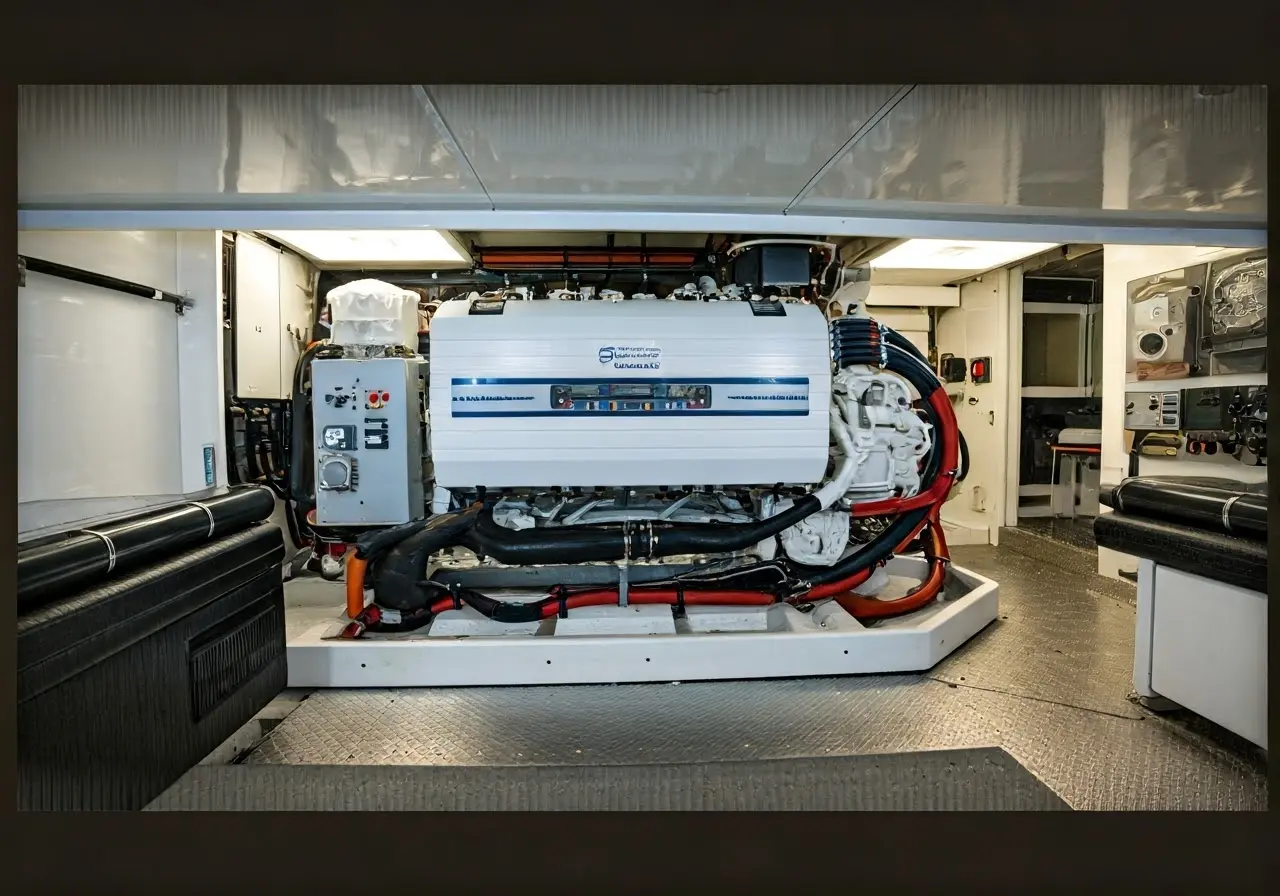Power inverters play a crucial role in enhancing the functionality and convenience of marine vehicles. Whether you’re out at sea for leisure or work, having reliable power sources can make all the difference. In this blog post, we will dive into the various benefits that power inverters provide for marine enthusiasts and professionals alike.

Understanding Power Inverters and Their Functionality
Power inverters are devices that convert direct current (DC) into alternating current (AC), enabling the operation of home appliances on a marine vehicle. This functionality is vital as many boats are equipped with batteries that provide DC power. Simply put, without a power inverter, you would struggle to run essential devices such as refrigerators, lights, and even entertainment systems on your boat.
But how exactly do power inverters work? They take the steady flow of DC from batteries and convert it into the same kind of AC electricity that we use in our homes. This makes it possible to plug in devices that require more power than what your boat's battery can provide directly. Understanding this conversion process is key to appreciating why power inverters are a game-changer for marine activities.
When onboard, the ability to create a consistent power supply empowers you to stay connected. Whether you're checking your emails out at sea or using navigation tools, having AC power ensures that you can keep vital systems running smoothly. Understanding this fundamental role of power inverters is essential when planning your journey and the amenities you wish to utilize.
Key Advantages of Using Power Inverters in Marine Vehicles
One of the most significant advantages of using power inverters in marine vehicles is the flexibility they offer. With a power inverter, you can power a wide variety of devices—from small gadgets like phones and cameras to larger appliances such as televisions and microwaves. This flexibility allows boaters to enjoy modern conveniences while out on the water, making trips far more enjoyable.
Moreover, power inverters enhance energy efficiency. By enabling you to use a wide range of AC-powered appliances, inverters reduce reliance on traditional generators, which can be noisy, fuel-consuming, and even harmful to the environment. Many marine vehicle owners find that switching to a power inverter leads to significant savings on fuel and maintenance costs in the long run.
In an era where staying connected is crucial, power inverters bridge the gap between marine adventures and communication. Imagine being able to charge your devices while enjoying the beautiful views of the coastline. Whether it's for work or leisure, having that AC power at your fingertips opens up new possibilities for both relaxation and productivity.
Finally, safety is a paramount consideration when using electrical devices on water. Power inverters come equipped with safety features that protect both the devices and the users. Many modern inverters include protections against overloads, short circuits, and overheating. This added layer of security provides peace of mind as you navigate through potentially challenging conditions.
Types of Power Inverters Ideal for Marine Applications
When selecting a power inverter for a marine vehicle, it's essential to know the different types available. The two primary categories are modified sine wave inverters and pure sine wave inverters. While modified sine wave inverters are generally more affordable, pure sine wave inverters produce cleaner power and are better suited for sensitive electronics, such as computers and medical devices.
Another important aspect to consider is the inverter's capacity, measured in watts. It's crucial to calculate the total wattage of the devices you plan to use on your boat to ensure that the inverter can handle the load. Choosing an inverter with an appropriate wattage rating ensures that you won’t experience interruptions while using your devices.
Many marine vehicles benefit from using inverters that feature multiple outlets. This allows you to connect various devices at the same time, enhancing functionality aboard. Furthermore, some advanced models now offer USB ports, adding convenience for charging mobile devices without the need for adapters.
It's also wise to select an inverter designed specifically for marine use. These models are often built to withstand the unique challenges of a marine environment, including moisture and vibrations. Investing in a marine-grade power inverter not only increases the longevity of the device but also contributes to a better overall boating experience.
Installation Tips for Power Inverters on Your Boat
Installing a power inverter in your marine vehicle requires careful planning and execution. First and foremost, it's crucial to choose a suitable location for installation. Ideally, the inverter should be placed in a dry, well-ventilated area to prevent overheating while in use. Additionally, ensuring that it’s easily accessible for future maintenance is a key consideration.
Preparing your boat's electrical system is another essential step. Before installing the inverter, consider the power source and assess whether you need to upgrade your battery or wiring. Consult with a marine electrician if in doubt, as making the improper connections could lead to damage or safety hazards.
Once the location and electrical requirements are sorted out, you can proceed with the installation. Be sure to follow the manufacturer’s instructions closely and use the appropriate tools to avoid damaging any components. If you're unfamiliar with electrical systems, it might be beneficial to seek professional help to ensure everything is installed correctly.
Lastly, it’s a good idea to test the inverter once installed. Performing a thorough check helps to confirm that power flows correctly and that all connected devices function as intended. Regular testing and adjustments can help you identify any potential issues before they become major problems, ensuring a smooth and enjoyable boating experience.
Maintaining Your Power Inverter for Longevity
Taking care of your power inverter is crucial to ensure its longevity and optimal performance. Regular maintenance should include checking connections and wiring for any signs of corrosion or wear. These components are often exposed to the harsh marine environment, making regular inspections vital.
Cleaning your inverter is another critical maintenance step. Dust and debris can accumulate over time, potentially obstructing airflow and causing overheating. Use a soft cloth to gently wipe the surface, ensuring any cooling vents are free from obstructions to promote efficient operation.
Moreover, regularly monitoring the inverter's performance is key. Pay attention to any changes in sound or functionality, as these could indicate the need for service or repairs. Keeping a close eye on performance ensures that small issues can be addressed before they escalate, avoiding unnecessary expenses.
Storing your power inverter properly when not in use is equally important. Protecting it from moisture, direct sunlight, and extreme temperatures extends its lifespan. If you're planning to store your marine vehicle for an extended period, consider disconnecting the inverter to safeguard it from potential damage.
Real-Life Examples: Power Inverters in Action
To truly understand the benefits of power inverters, nothing beats real-life examples. Take, for instance, the family who embarked on a two-week sailing trip along the coast. With a power inverter installed, they were able to run their refrigerator, ensuring they had fresh food and drinks during their adventure. This convenience allowed them to focus on enjoying their trip rather than worrying about provisioning at every port.
Another compelling story is that of a professional fisherman who uses a power inverter to run their fish-finding equipment and charge batteries during long days on the water. The inverter has transformed their daily routine, allowing them to gather essential data about fish locations without worrying about draining the boat's battery.
Moreover, numerous boaters have shared stories of how an inverter allowed them to enjoy outdoor movie nights at their marina. With the ability to power a projector and screen, the experience became a cherished tradition among friends and family. Such stories show that power inverters can enhance the overall enjoyment of being on the water.
In some cases, power inverters have even been lifesavers. For example, during unexpected storms, a group of boaters relied on their inverter to power their communication devices, allowing them to stay connected to emergency services and fellow boaters. This critical function underscored the importance of having a reliable power source in marine settings.
Wrapping It All Up
In conclusion, power inverters are an essential component for any marine vehicle, offering enhanced flexibility, convenience, and efficiency. By understanding how to effectively utilize these devices, you can significantly improve your marine experience, whether you're cruising the coast or navigating out at sea. Investing in a quality power inverter ensures you have the energy you need to enjoy your time on the water fully.

